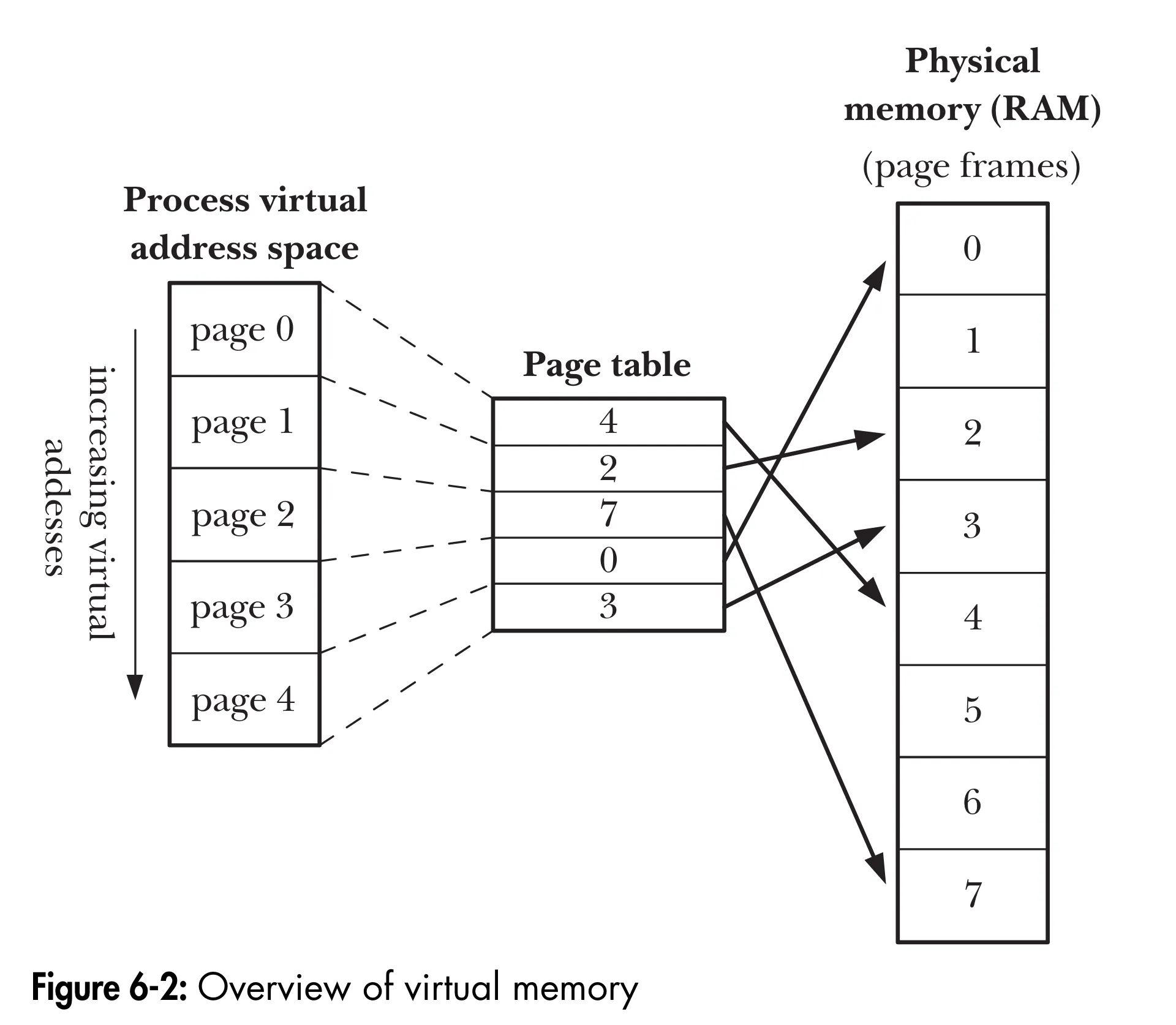Processes Overview
- A process is an abstract entity, defined by the kernel, to which system resources are allocated in order to execute a program.
- From the kernel’s point of view, a process consists of user-space memory containing program code
and variables used by that code, and a range of kernel data structures that maintain information about
the state of the process:
- PID
- Virtual memory tables
- File descriptors tables
- Information relating to signal delivery and handling
- Process resource usages and limits
- Current working directory
- Others …
Process ID and Parent Process ID
- Each process has a process ID (
PID), a positive unique integer that identifies the process on the system.
#include <unistd.h>pid_t getpid(void);
// Always successfully returns process ID of caller// typedef int pid_t;- Each process has a parent, to find out the process ID of its parent, use the
getppid()system call
#include <unistd.h>pid_t getppid(void);
// Always successfully returns process ID of parent of caller- Note that the parent of each process has its own parent, and so on, going all the way back to process 1 (
init). - If a child process becomes orphaned because its “birth” parent terminates,
then the child is adopted by the
initprocess.
Virtual memory layout of a process
Virtual memory management
Basic terms
-
A virtual memory scheme splits the memory used by each program into small, fixed-size units called
pages. -
Correspondingly, RAM is divided into a series of
page framesof the same size. -
At any one time, only some of the pages of a program need to be resident in physical memory page frames; these pages form the so-called
resident set. -
Copies of the unused pages of a program are maintained in the
swap area— a reserved area of disk space used to supplement the computer’s RAM—and loaded into physical memory only as required. -
When a process references a page that is not currently resident in physical memory, a
page faultoccurs, at which point the kernel suspends execution of the process while the page is loaded from disk into memory. -
The kernel maintains a
page tablefor each process, as shown below:
- The
page tabledescribes the location of each page in the process’s virtual address space. - Each entry in the page table either indicates the location of a virtual page in RAM or indicates that it currently resides on disk.
- Not all address ranges in the process’s VAS require page-table entries (if no entry found, return a
SIGSEGVsignal)
- The
Locality of reference
-
Like most modern kernels, Linux employs a technique known as
virtual memory management. The aim of this technique is to make efficient use of both the CPU and RAM (physical memory) by exploiting a property that is typical of most programs:locality of reference -
2 kinds of locality:
Spatial locality: the tendency of a program to reference memory addresses that are near those that were recently accessed.Temporal locality: the tendency of a program to access the same memory addresses in the near future that it accessed in the recent past (because of loops)
-
The upshot of locality of reference is that it is possible to execute a program while maintaining only part of its address space in RAM.
-
To support this organization
Environment List
- Each process will maintain a list of
environment variables(cat /etc/$PID/environ). - When a new process is created, it inherits a copy of its parent’s environment.
- A common use is in the shell.
- To access the environment from a program, use the global variable
char **environ, as shown below:
#include <stdio.h>#include <stdlib.h>
extern char **environ;
int main(int argc, char *argv[]) { char **p = environ; while (*p != NULL) { printf("%s\n", *p++); } exit(EXIT_SUCCESS);}Retrieve retrieves individual values from the process environment.
#include <stdlib.h>char *getenv(const char *name);// Returns pointer to (value) string, or NULL if no such variable
#include <stdlib.h>int putenv(char *string);// Returns 0 on success, or nonzero on error
int setenv(const char *name, const char *value, int overwrite);// Returns 0 on success, or –1 on error
int unsetenv(const char *name);Returns 0 on success, or –1 on error- Clean an entire environment
#define _BSD_SOURCE /* Or: #define _SVID_SOURCE */#include <stdlib.h>int clearenv(void)
// Returns 0 on success, or a nonzero on error